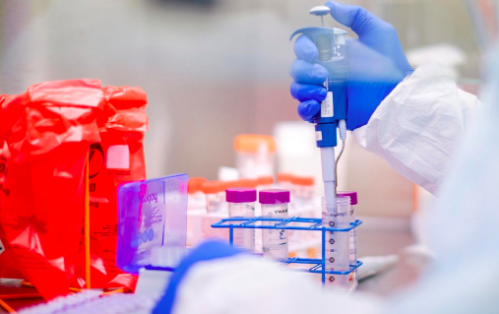At this stage, the most important work being done to combat the COVID-19 virus is in the domains of clinical medicine and biomedical research: developing and testing vaccines and antivirals. But artificial intelligence (AI) and other technologies can play a big role in alleviating the current crisis and others like it to come.
Imagine, for instance, a pandemic with the transmissibility characteristics of COVID-19 but the deadliness of H1N5. Or picture a pandemic like COVID-19 but with a bias toward killing children and infants rather than the elderly. If we want to prevent such eventualities, we need to do something beyond just developing vaccines and antivirals for COVID-19.

The good news is, we do have that capability. Right now, in early 2020, is a rare moment when a large portion of humanity’s resources is focused on the same problem. This is precisely the sort of moment when significant changes in direction can happen.
The changes we need to implement now to most effectively minimize the damage from COVID-19 and minimize the odds of future even worse pandemics, are both conceptually simple and devilishly difficult. We need to change our consciousness to think less about our own selfish goals and more about the networks we’re embedded in.
In addition, we need to change our social institutions — away from centralized control hierarchies, away from incoherent messes fraught with power struggles, and toward efficient and intelligent decentralized dynamics.
Consider China. Its response to COVID-19 illustrates the double-edged nature of centralization. China has pretty effectively leveraged its centralized power to provide medical data to research institutes and location data of its citizens to track down the virus. But China’s centralized control of information dissemination — for instance, its imprisoning doctors who tried to tell the public the virus existed — was also largely responsible for the rapid wide spread of the virus.
Conversely, other nations such as the US which have responded to COVID-19 in a more localized and distributed manner have been slowed and hampered by lack of effective methods for coordination and information dissemination. What is needed is neither China-style top-down control nor Trumpian chaos but, rather, a set of efficient, well-designed decentralized social and information dynamics.
Cutting-edge decentralized technologies like blockchain and agents-based AI can provide dramatically more effective ways of tracking, controlling, understanding and ultimately curing pandemics.
In the next weeks and months we can expect to see big US tech companies deploy some of their resources to help combat COVID-19 in various ways. We must of course welcome anyone who will contribute resources of any kind to combating coronaviruses or other medical issues. However, there are strong reasons to want future pandemic response and medical analytics and the whole shebang to be under democratic and participatory control rather than guided by big tech companies.
We can’t trust Big Tech to keep interested in public health after the current crisis fades, nor to consistently act in the public good as opposed to just catering to customer or investor interest.
We need to place our faith instead in humanity as a whole.
A rising number of technology projects operating at the intersection of AI and blockchain are emerging with ideas and initiatives leveraging decentralized AI to fight COVID-19 and prevent future similar crises. Cardano Foundation has launched a major decentralized computing effort aimed at solving COVID-19 related problems.
The decentralized biomedical AI project Shivom is aiming to leverage their blockchain based genomics platform to accelerate COVID-19 bioinformatics analytics, toward the end of validating potential vaccines and antiviral therapies.
Shivom co-founder Axel Schumacher, a geneticist, notes that “for the first time in human history, we possess powerful convergence technologies such as artificial intelligence, precision medicine, and blockchain, which can help us cope with the effects of pandemics.”
In Western-style democracies and other societies that value personal freedom,effectively tracking the flow of an epidemic requires technology that respects personal privacy and data sovereignty while collecting overall data on peoples’ movements and interaction.
This is a perfect use case for tools like multiparty computation and homomorphic encryption, which are integrated into modern blockchain-based information management platforms. These allow data
as contributed by a number of people to be analyzed together, and without anyone’s data getting disclosed to others.
Secure and privacy-respecting sharing of personal medical data also allows the development of personalized prognosis models — which use your own medical and lifestyle data to predict, for instance, if you do get infected with COVID-19, how likely it is you will get a very severe or life-threatening case.
And the same data needed to fuel personalized customization of antiviral remedies or protective social/behavioral prescriptions can also be used to fuel AI-driven biomedical hypothesis generation aimed at understanding how COVID-19 works, so as to produce cures and preventative measures in a more principled and less trial-and-
error based way.
Projects like Shivom, Rejuve and Medibloc enable individuals and clinics to share medical records and data in a secure way, and in some cases to receive a fraction of any financial value ultimately created using their data.
Standard epidemiological models are too crude to provide effective estimates of the likely impact of various potential behavioral modifications and social restrictions on the spread of the COVID-19 virus. A promising solution is to shift to agent-based simulations, in which one builds a
simulation model of a society, populated by simple virtual agents emulating the behaviors of various sorts of people obeying the social restrictions and behavioral adjustments being evaluated.
The more AI you can put behind the agents populating the simulation, the more realistic the results will be.
My own organization, the Decentralized AI Alliance (DAIA), has organized an online hackathon, the COVIDathon. It’s aimed at bringing together AI and blockchain developers from around the globe to work on ideas like this — and to conceive new ideas for leveraging these technologies to help with the current and future pandemics.
Whether these efforts by the decentralized AI community will make a critical difference in accelerating the resolution of the COVID-19 crisis remains to be seen. But it is clear that, unless these sorts of intelligent decentralized systems are developed and rolled out now, humanity will be nearly as poorly prepared to cope with the next pandemic as this one.
For aNewDomain, I’m Ben Goertzel.
Disclosure: The author is directly involved with the Rejuve, DAIA and COVIDathon project and is an advisor of the Shivom project.
Cover image: “State Public Health Laboratory in Exton Tests for COVID-19” by Governor Tom Wolfe (CC BY), Flickr













